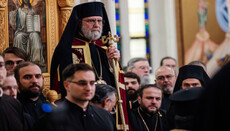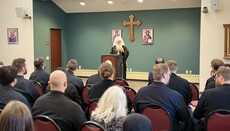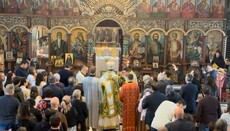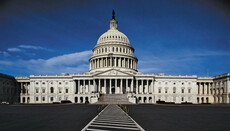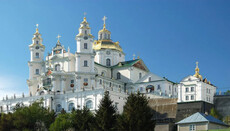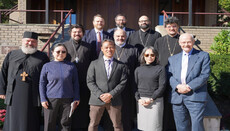Paschal Encyclical of His Holiness Porfirije, Patriarch of Serbia
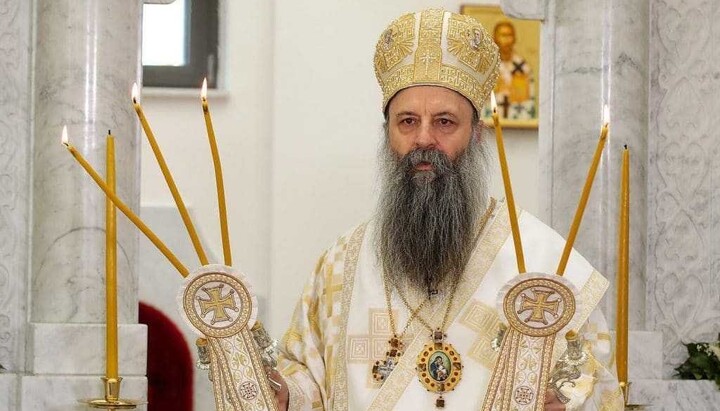
Paschal Encyclical of Patriarch Porfirije: The Resurrection is Victory over Death, and the Liturgical Life – a Path to Eternity”
Porfirije
By the Grace of God Orthodox Archbishop of Pec, Metropolitan of Belgrade-Karlovci, and Serbian Patriarch, with all the Hierarchs of the Serbian Orthodox Church to all the clergy, monastics, and all the sons and daughters of our Holy Church: grace, mercy, and peace from God the Father, and our Lord Jesus Christ, and the Holy Spirit, with the joyous Paschal greeting:
Christ is Risen!
The Event of Christ’s Resurrection, dear spiritual children, is the central event in the entire history of the human race and the divine economy of our salvation. It is the foundation, the cornerstone, and the ultimate goal of both our faith in God and our salvation. For, “if the dead are not raised… then our preaching is in vain and your faith is in vain,” says the Holy Apostle Paul (cf. 1 Cor. 15:13–14). We all know that the Lord’s disciples scattered and abandoned Christ when He was crucified and died. They had, in fact, expected a Savior who would be immortal and who would free them from death as well. The words of the apostles: “But we had hoped that He was the one to redeem Israel” (Luke 24:21), clearly confirm this. However, Christ died and after three days rose again. After the Resurrection, when He appeared alive to the apostles and those who were with them, they all gathered again around Him and bore witness that He truly died and rose again and is indeed the Savior of the world. They confirmed this testimony by giving their lives for Christ.
The Resurrection of Christ affirms the fact that death is the greatest problem of humankind and all creation. “The last enemy to be destroyed is death,” says the Holy Apostle Paul (1 Cor. 15:26). Every person, whether aware of it or not, as well as all creation, carries within them death and the fear of death, but also the desire to overcome death and live eternally. This manifests itself in many ways: through food and drink, natural reproduction, the accumulation of wealth, the founding of nations, the development of science and technology in order to explore nature and find within it a cure for death — even through the denial of the other beside oneself, including war and killing others, fighting for more territory and independence from others. Yet none of this can save humanity and creation from death. In fact, these things only multiply death. And if death has the final say in history, then everything is meaningless. However, Christ has risen and opened the way to resurrection for all creation. How, then, can each person and all of nature overcome death?
Creation can overcome death and live eternally only in communion with God in Christ, through the Holy Spirit. All creation, including man, having been created out of nothing, is by nature mortal and cannot surpass death or exist apart from communion with God. That is why, at the end of creation, God made man in His own image, so that through man, all creation might attain communion with God and live eternally. This was first shown to us by Christ Himself through His life. The Son of God became incarnate and became a perfect man, like us, yet without sin. Throughout His life, Christ demonstrated His connection and devotion to God the Father, not only as His eternal Son but also as a man. He did not renounce God the Father for the riches of this world (cf. Matt. 4:8–10). Not even in the face of suffering and crucifixion did Christ renounce God the Father or His love for Him, all out of love for us and for His creation. Christ’s death, of course, was voluntary. He willingly became man and took our mortal nature into His divine Person in order to free us from death, thus fulfilling the will of God the Father. When God created the world and ultimately man as a free being, He desired that eternal life be the result of communion between Himself and man, not only by God’s will but also by the will and freedom of man and creation. Otherwise, if God had forced eternal life upon us and creation, our existence would have been imposed, and thus it would not be joy, but torment.
God the Father showed immeasurable love for His Son Christ, even as a man, and through Him for all creation, by raising Him from the dead through the Holy Spirit (Acts 2:24) and making Him the Firstborn from the dead. This means that God the Father will also, in Christ, raise us all and all of nature at the end of history, freeing us from death. How can a person attain communion with the Risen Christ and thereby overcome death?
Based on the testimonies of the Evangelists, for forty days after His Resurrection, the Risen Christ met with His disciples and followers (Acts 1:3) in the Liturgy, as the One who serves (cf. Luke 24:30–31). The Risen Christ is revealed in the Liturgy. After His Ascension into heaven, our Risen Lord Jesus Christ remains present in the Liturgy to this very day. However, after the Ascension, He is present here through the Holy Spirit, but now in “another form,” i.e., in the person of the one who serves the Holy Liturgy — the bishop (or the priest), who is the icon of Christ. St. Ignatius the God-bearer confirms this when he says: “Where the bishop is, there let the people be; just as where Christ is, there is the Catholic Church” (To the Smyrnaeans, 8). More precisely, the Risen Christ is present in history as the liturgical community. Therefore, any person who desires to overcome death and live eternally can do so by becoming a member of the Holy Liturgy through Baptism in the Holy Spirit. In the Liturgy, a person attains personal communion with Christ, and with the bishop and all others who are members of the Liturgy. That is why, in every Liturgy, dear spiritual children, and especially on this day, we celebrate the event of Christ’s Resurrection from the dead and His presence among us, and we anticipate the general resurrection and the ultimate victory over death. When Christ comes again in power and glory, He will gather all nations around Himself (Mark 13:26–27) in one place, and then will be the final judgment of the world and the fulfillment of the Kingdom of God, of which the Holy Liturgy is both the icon and foretaste here and now in history.
Since the Holy Liturgy is the icon of the future Kingdom of God and the eternal, true existence of man and nature, the first Christians organized their everyday lives based on their liturgical experience. God the Father was their Father, while they were all brothers and sisters to one another. Everything they had was shared in common. They frequently gathered for the Holy Liturgy, offering bread and wine to God and giving thanks for life and existence, eagerly awaiting Christ’s second coming in power and glory and the general resurrection. Many throughout history, after the apostles and the first followers of Christ, followed this Orthodox liturgical experience of future communion with God the Father in Christ, and with all people and all creation through the Holy Spirit, forming a civilization based on liturgical foundations — a Christian civilization of which we, as a people, have become and remain a part. We too, dear spiritual children, must strive toward and live by this liturgical way of life.
However, modern man has based his life on himself, without Christ and without others. Our modern civilization has defined man as a thinking individual who approaches life through logic, determining even existence itself based on reason, and therefore anything that does not fit into human logic either does not exist for modern man or is, at best, suspicious and useless. Thus, the modern man has become an atheist, because God and His existence cannot be grasped through human logic. Viewing himself as an individual, the modern person feels no need for others or for community to exist, but defines himself through self-awareness — through the idea “I think, therefore I am.” And when modern man does seek communion with another, it is not through personal and physical contact, as shown in the Liturgy, but through the internet and social media. He sees in the other — and thus in God as the ultimate Other — an enemy who limits his freedom and threatens his being. As a result, modern man has begun creating ethnically homogeneous states and separating from others, considering them undesirable and enemies. This understanding of existence has led to unprecedented catastrophes, including two world wars with immense suffering. It continues even today, as we are all witnesses. One example is the suffering of our people in Kosovo and Metohija at the hands of the local Albanian authorities, who are expelling Serbs from their ancestral homes and daily harassing those who remain, seeking to create their own state on Serbian territory, consecrated by martyrs and ascetics, and filled with many Serbian Orthodox churches and monasteries. It would be far better, however, for all who live in this area — and for all people everywhere — to live in peace with one another, respecting and helping each other in daily life. For the earthly kingdom is fleeting.
As the Church, the people of God, dear brothers and sisters, we must oppose this individualistic way of life by living according to the example of the apostles, ascetics, martyrs — in other words, according to the liturgical mode of existence of the Church. This, of course, does not mean a call to return to the past or to copy it. The Eucharist, as the icon of the future Kingdom of God, is an inexhaustible source and inspiration for ever-new creativity in all aspects of life — from our daily living, to family, to society, to science and the arts. In the community of freedom with Christ and others, as revealed through the Liturgy, man forefeels his true existence. Only in a community of freedom and love with others and with God does man become an absolute and unrepeatable person. In that community of love with others, all of nature and everything around us becomes dear and precious to us. The Liturgy also shows us that nature — offered in the form of bread and wine — is given by God for us to live from, but also to care for and offer back to God, because He created it too for eternal existence. If nature ceases to exist — and we have brought it to the brink of destruction by exploiting it for our individual pleasures — we too will cease to exist, for we are a part of nature.
With great sorrow, experiencing the tragedy of war and suffering around the world, and deeply aware of the tensions and misunderstandings affecting our own land and regions, the Church can offer no other message than this: the liturgical way of life is the only true answer to these problems. This applies to all, including us who belong to the Church, for no one is without sin. This way of life, most importantly, will bring us victory over death and eternal life, but also a better and more just society. However, this way of life also demands a willingness to sacrifice, because the world still lies in evil, which will remain active until Christ returns again to abolish evil and death and establish the Kingdom of God. Until Christ’s second and glorious coming, we humans will never, by our own strength, create a perfect society — a paradise on earth. That is why we strongly call on all participants in social life to, for the sake of the good and progress of the people, build peace, mutual respect, and dialogue.
As we translate the Church’s liturgical experience into everyday life, we must not forget the Holy Liturgy itself as an event and as participation. To live as a Christian ascetic without participation in the Holy Liturgy is not enough to overcome death and attain eternal life. In the Liturgy, we meet the Risen Christ Himself (Luke 24:30–31) and are united with Him and with all those who are united with Him, as well as with all created nature, through Holy Communion. In this, we foretaste the future Kingdom of God, the general resurrection, and the victory over death. At the same time, by serving the Liturgy and living the liturgical ethos, we, dear brothers and sisters, will best proclaim to the world our faith in the Risen Christ and the general resurrection as the triumph of life over death. This will be our proclamation of the Resurrection and eternal life, which Christ entrusted to us — not only through words but through our way of life — until He comes again in power and glory and establishes the Kingdom of God.
Therefore, as we serve the Holy Liturgy today with special joy, together with all our people — especially with our brothers and sisters in Kosovo and Metohija — let us give thanks to the One God in Trinity: the Father, the Son, and the Holy Spirit, for all that He has done and will do for us and for our eternal life, and let us greet one another, and all people of goodwill, with the joyful greeting:
Christ is Risen! Indeed, He is risen!
Given at the Serbian Patriarchate in Belgrade at Pascha 2025.
Originally published on the website of the Diocese of Eastern America, Serbian Orthodox Church
